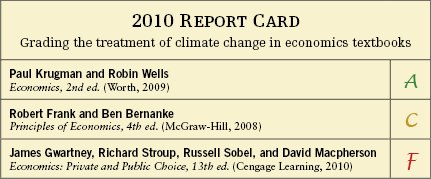As publishers scramble to update economic textbooks in light of the recent financial crises, Sightline’s new report, Grading Economics Textbooks on Climate Change, reveals that many are overlooking another looming crisis: climate change.
Grading Economics Textbooks on Climate ChangeFrom the Report:

Sightline fellow Yoram Bauman reviews 16 of the bestselling economics textbooks for their treatment of climate change. While grades run across the board, it’s clear that many are still using information that is several years old.
Noted economists like Nobel prize-winning Paul Krugman and conservative Harvard professor Gregory Mankiw both scored A’s, while Federal Reserve Chairman Ben Bernanke’s book received a C.
Others fared worse. Five books fell into the “not recommended” category, because they contain factual inaccuracies and omissions–or worse, negligent misinformation in the face of widespread scientific consensus.
Among the worst offenders is Economics 18th Ed., by Campbell McConnell, Stanley Brue, and Sean Flynn, which makes up 20 percent of the economics textbooks purchased each year. The only F given went to Economics: Private and Public Choice, 13th Ed., by James Gwartney, Richard Stroup, Russell Sobel, and David Macpherson, which denies carbon dioxide’s contribution to global warming and alludes to a climate “conspiracy.”
As leaders of the next generation’s economy, it’s crucial that students have access to the most accurate and timely client science and policy. What’s clear in this report is that many authors and publishers are falling short.
Grading Economics Textbooks on Climate Change is written by Sightline fellow and University of Washington Environmental Economist Yoram Bauman.






